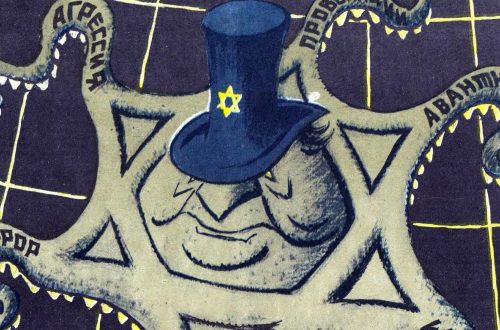Guest post by Paul Leslie
The behavior of locally-based British decision-makers at the time of the Farhud was not the only example of passive complicity by quasi-colonial or quasi-imperial authorities acting in Britain’s name, motivated by various realpolitical considerations. There was also the 1945 massacre in Tripoli, which caused over 100 deaths and many more injured, when the British Military Administration deliberately waited two days from the initial outbreak on November 5 before intervening decisively (as documented in detail for example by the Quai d’Orsay officials and diplomatic representatives whose correspondence is contained within the file series Afrique-Levant, 1945- ). There was also the pogrom which erupted in Aden at the beginning of December 1947.
Britain was not the only European power guilty in certain situations of abandoning increasingly vulnerable and precarious minority communities to murderous mobs composed of members of the “colonized” majority. In August 1934 the Jews of Constantine paid a bloody price for the manipulation of local passions by professional anti-Jewish agitators, various mainstream Algerian nationalist leaders and morally corrupt pied noir politicians. Whereas such cases of the abandonment of minority communities usually coincided with times of crisis for (quasi-) imperial or colonial domination (another example from Iraq is that the government condoned if not promoted the massacre of Assyrians in Simele in August 1933), the April 1912 Fez massacre occurred at the very beginning of the French protectorate in Morocco (ratified by the Treaty of Fez of March 30 1912). The non-intervention of French troops stationed just outside the mellah had been preceded by raids in this Jewish quarter which ended with the extensive confiscation of arms both allegedly or actually illicit and weapons legitimately held for self-protection.
All this is to provide some extra general context to the following extracts of articles which appeared in the (alas!) now defunct Scribe.
The Golden Carpet which includes The Silver Crescent by Somerset de Chair Reviewed by Naim Dangoor
We recently came across this book which was published in I944 by Faber and Faber, London. In it the author, an Army Intelligence Officer and an MP, relates British Army operations in Iraq during the second world war. The interesting part of the book is his reference to the farhud of 1/2 June 1941 in which hundreds of Jews were massacred and thousands of homes and businesses were looted, and which marked the beginning of the end of the 2500-year-old Jewish presence in the Land of the Rivers. During the Month of Rashid Ali’s revolt of May 1941 and the ensuing fighting between the Iraqi and British armies which the author calls the Thirty Day War, the British ambassador, Sir Kinahan Cornwallis, and his staff were trapped inside the Baghdad Embassy. On 29 May, Rashid All and his government fled the country, and his forces surrendered unconditionally to the British who, however, stayed outside the capital for a few days. Somerset de Chair, the author of the book, was staying at the embassy during the anti-Jewish riots in Baghdad. Over a game of bridge Sir Kinahan told him that 2,000 people, mostly Jews, were believed to have been killed in the one night looting. Although the actual figure turned out to be much less, the estimate of”2,000 people, mostly Jews, killed” has an important significance. The riots did not surprise the embassy and were probably abetted by its secret agents. The figure reported to the ambassador of 2,000 killed appears to have been an acceptable punishment to inflict on our innocent community by withholding, for whatever reason, law and order from the Capital. De Chair’s interpreter, who had assumed the name of “Reading” and was thought to be a Palestinian Arab, but was in fact an Iraqi Jew, asked him earlier, “Why do our troops not go into Baghdad? There will be many people killed if our troops do not enter”.
De Chair writes, “This was my own view and the ways of the Foreign office were beyond my comprehension. From the hour of the Cease Fire their word had prevailed. Having fought our way, step by step, to the threshold of Baghdad, we must now cool our heels outside. It would, apparently, be lowering to the dignity of our ally, the Regent, if he were seen to be supported on arrival by British bayonets”. (p.118).This is not the whole story. There was no need for British troops to enter Baghdad. The local administration and police were quite capable and willing to enforce law and order but they were not allowed to act, even to fire shots in the air to disperse the rioters.
On the morning after the farhud, the Governor of Baghdad, Khaled Pasha AI-Zahawi, whose mother was Jewish, came to our house in Alwiya and complained bitterly to my father that the Committee of Public Safety, consisting of the capital’s Governor, Mayor and Head of Police, which was formed after the flight of Rashid All, had been in touch with the Embassy, the Regent and Nuri Said for permission to disperse the rioters and maintain law and order, but they were refused permission. The riots were staged on purpose, and the rioters were given free rein so that the anti-British extremists would let off steam and forget the defeat of their uprising. This was a pattern that was to be repeated following the capture by British forces of many towns of the Middle East in the first years of WWlI.
Hitler’s holocaust was yet to come.
Captain Shaul Shemtob-Reading, MBE, who was on the military intelligence at the Headquarters of the British Army advancing from Jordan towards Iraq to crush the regime of Rashid All, has now been able to break his silence and write:
Early in May I was entrusted by the Army Command to deliver an urgent message to the Royal Family in Baghdad; hostilities had since commenced and continued up to the end of the month, At the Iraq/Transjordan frontier I borrowed one of Nairn Overland cars with its driver and proceeded at midnight to Baghdad .I entered Baghdad area by passing through Kadhimain and arrived at the Royal Palace Qasr A1 Rehab. The Lord Chamberlain ushered me into the presence of the Queen Mother and the young King Faisal. The Regent, Abdullah, was not present. He had escaped from the Palace disguised as a woman and gone into hiding. The Queen Mother was in a distressed state over the safety of her son and I gave her the message that the British Army, as well as a group of the Hashemite army of Emir Abdallah under Glubb Pasha, were advancing to restore order. During the army’s advance, we were continuously bombed and strafed by Mussolini’s fighter bombers and German planes specially painted with Iraqi insignia, also with sporadic shelling, I was in the advance party and at one point we met an Iraqi officer with a white flag of surrender acting on the orders of his commanding officer, who came out of hiding shouting “sahibdakhilak'” (I am at your mercy) because he was afraid he and his contingent would be killed on sight. This senior commander was later used to good purpose by giving false information deliberately spread by our unit to the effect that there are many tanks in our column advancing on Baghdad. On arriving near Habbaniya, at which point the whole Iraqi army had retreated and disappeared and Rashid All and his ministers escaped to Iran, the Regent, Abdul Ilah, accompanied by Dawood Pasha E1 Haidari arrived at the British Headquarters to see the GOC. The Chief of the military intelligence, Regimental Commanders and myself were present when the Regent thanked the British Government for saving the situation AND requested that the British Army enter Baghdad to stop the riots and the massacres taking place. The GOC replied that he was well aware of the serious situation, but acting on strict orders from London, was unable to enter Baghdad.
From Mr Somerset de Chair, now 82, author of The Golden Carpet, which was reviewed in Scribe 59.
I have returned from America and have studied the review of The Golden Carpet which you sent me. You certainly make some extraordinary statements which I cannot agree, such as “The riots were staged on purpose, and the rioters were given free rein so that the anti-British extremists would let off steam and forget the defeat of their uprising.” No evidence whatever is given for this, and I can only say that the ambassador and officials in the Embassy when I was there were horrified by the riots that were going on, which as I said in the book, occurred because the British Army outside Baghdad was not allowed by the Foreign Office in London to enter the town for fear of undermining the prestige of the Regent and the young King whom we had restored. There was no reason, as far as I could see, that the police could not have performed their usual duties in maintaining public order without waiting for permission from any Committee of Public Safety. Until the British column was allowed to enter, the people inside the Embassy scarcely dared put their noses outside the grounds of it. I think Brigadier Kingston and I with our drivers were about the only British soldiers, let alone civilians, seen in the streets during this unsettled interim period. As you will see from the book, we found the demonstration very hostile. I am afraid the whole tenor of your article is so anti-British that it is difficult for me to make a reasoned reply to it all. What you say about my interpreter, Captain Shaul Shemtob-Reading is, of course, extremely interesting to me, and seems basically accurate beyond the fact that it was at the irrigation centre at Kahn Nucta that we found the enemy’s telephone still working, and I used the opportunity to spread the false information through Reading as my interpreter that we were Iraqis surrounded by the British, who had tanks. (Scribe: It is clear that the British forces outside Baghdad were under orders from the Foreign Office not to intervene to stop the farhud.)
This is what Dame Freya Stark, who was employed by the British Embassy, wrote to her mother after witnessing the farhud in June 1941: “You can imagine too what a time it is for a propagandist with the country seething with disguised Nazis and swastikas appearing every-where (even at the back of my car). The people who are doing us even more harm than the Nazis are the Jews, who are jittering.”


